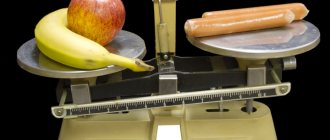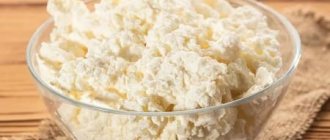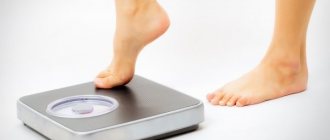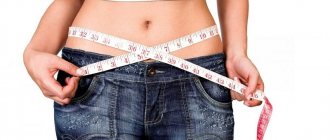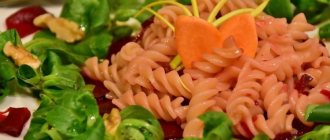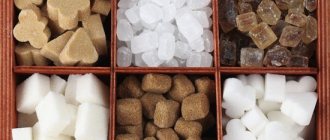Sedentary lifestyle
Prolonged sitting, standing, or lying in one place does not stimulate the muscles of the body and does not cause them to contract frequently. Quiet muscles do not drive blood through the veins and metabolism, along with blood circulation, slows down.
A muscle in a relaxed state allows only 25-50 capillaries per 1 square millimeter of flesh to pass through it. And a muscle that periodically experiences stress can pass up to 3000 capillaries per 1 square millimeter. Due to a sedentary lifestyle, on average, about 40% of the blood does not circulate properly and stagnates.
Is it possible to stock up on protein?
No. There is no depot or reserve of vitamins, proteins and microelements in the body, so before fasting there is no need to eat kilograms of meat and pancakes, and during fasting, fish in huge quantities in order to create a supply of nutrients. It will still not be absorbed; at most, new fat deposits will appear.
Only a certain amount of each component from a certain type of product is absorbed. Therefore, one should not think that if a person eats 200 grams of meat or fish instead of 100 grams, this will create a certain reserve. No.
If the energy entering the body along with food rich in carbohydrates is not spent, then it goes to fat synthesis, and weight gain begins.
It is important to eat a varied and balanced diet during fasting. Due to the fact that the synthesis of all protein substances suffers, in addition to nuts, dried apricots, honey, it is necessary to introduce multivitamins and microelements, freshly squeezed juices (especially pomegranate) into the diet, and to prevent electrolyte deficiency, eat raisins and grapes.
Calorie restriction
Numerous studies on mice and monkeys have found that the most important thing is to reduce the total calorie content of the entire diet, and not its individual elements. In 1934, Cornell University researchers Mary Crowell and Clive McKay showed in mice that an overall reduction in dietary energy increased the average and maximum lifespan of the test group by 30 to 50 percent. This discovery renewed the race to find the recipe for the elixir of eternal youth.
But no individual elements, the reduction of calorie content of which will significantly accelerate the normalization of metabolism, were identified during the research.
Don't forget about fats
Ignoring fats during fasting is dangerous. After all, they give us thermal energy and allow us to carry out labor, mental, physical and other activities. In addition, even if vitamins A, D, K, E have entered the body, without fatty acids their presence makes no sense - they cannot be absorbed.
In order for the body to function properly, it needs to consume 20–25% of the daily calorie intake from fat. Moreover, this number should include both omega-3 fatty acids (flax seeds, fish oil) and animal fats. It is optimal if 40% of the fat consumed comes from animal fats (dairy products, meat, etc.).
Without animal fat (saturated fatty acids), the body will have a difficult time, because animal fat contains lecithin and vitamins A and D, but, most importantly, cholesterol, which is part of all cells and tissues of the body and synthesizes vitamin D.
Therefore, during the fasting period, be sure to eat foods rich in healthy fat: cashews, almonds, hazelnuts, olive oil, flaxseed oil, corn oil and avocado. Yes, they will contain significantly less saturated fat than animal products, but a little is better than nothing. At the same time, I repeat, do not overuse vegetable oil.
Muscle growth
Do you constantly exercise and practice a balanced diet, but the extra pounds still don’t go away? Most likely, you are an endomorph. An endomorph is one of three body types, which is characterized by increased body fat, short or average height, large bones and wide hips. A person with an endomorph body type needs much more physical activity to lose excess weight. But, muscle mass with such a physique is gained much faster. Therefore, fat consumption and muscle growth can fluctuate around the same weight range.
I can't lose weight
Many people try to lose weight, but not everyone succeeds, despite dietary restrictions and exercise.
Why does this happen?
To understand why the weight does not go away, but remains in place, first analyze your daily diet and physical activity. Check whether you are following your diet.
There may be several reasons for this:
- Maybe you eat healthy but high-calorie foods every day? For example, avocado, grapes, banana, sweet fruits, nuts, cheese. Then there will be no benefit from the measures you have taken to lose weight;
- Or maybe you follow a diet all week, eat buckwheat, chicken breast, and on Sunday you allow yourself to eat barbecue, dumplings, postures and drink carbonated drinks?
- The reason that you cannot lose weight may be due to various diseases: gastrointestinal tract, thyroid gland, hormonal imbalance, problems with nerves. Consult a doctor, and it is quite possible that after treatment your weight will return to normal.
If you limit yourself in nutrition, and then allow yourself to eat whatever you want, then when you switch to a regular diet, even more extra pounds will appear.
Wrong food intake
In a person’s diet, both the diet and the balance of nutrients can go wrong: - It’s enough to eat fast food and it will clog the body with sugar, toxins and fats. And in a littered environment, metabolism is disrupted and every extra kilogram increases the load on the cardiovascular system.
— Wrong eating is considered to be eating once or twice a day, as well as eating food earlier than two hours before bedtime.
— When choosing a diet, you should keep in mind that the best solution is always in the middle. Throwing from one extreme to another, from overeating directly to a strict diet, is very harmful to health and causes gastrointestinal diseases.
— Lack of fat has a bad effect on the condition of teeth and bone strength. Fats are necessary for the absorption of vitamin D. The use of drugs and supplements that accelerate the breakdown of fats is recommended to be combined with calcium intake.
— An overdose of drugs that reduce appetite, especially in combination with “dry” fasting, leads to disruption of the water-salt balance in the body, which greatly affects the kidneys and liver.
— A diet that lacks proteins can lead to disruption of water-salt metabolism in the body. Proteins are actively involved in removing excess fluid from the body, and their lack leads to the accumulation of water and swelling.
- Using only one diet to lose weight can cause the extra pounds to come back again. This is usually caused by stress from sudden weight loss and hormonal imbalance. To avoid such problems, a weight loss course should combine different approaches: both diet and exercise.
I can’t lose weight - advice on what to do
First of all, you need to set a clear goal for yourself. She must be:
- Measurable. You set yourself the goal of achieving a specific weight by a certain period;
- Achievable. Those. you can easily achieve the desired weight by the designated date;
- Worded positively. The goal must be meaningful and you must have the desire to achieve it;
- There must be motivation to lose weight.
How not to overeat and start losing weight - 15 tricks
Losing weight is not necessarily a painful process with long workouts and exhausting diets.
You can lose weight with relative comfort if you know some tricks. But you will have to adhere to them constantly, and not several times a year:
- Start changing your eating habits gradually and with a positive attitude.
- Eat little by little. Divide your usual portion in half, eat half, and let the other sit for 20 minutes. After this time, it is quite possible that you will not even remember about it. The ideal portion should fit into cupped palms
- Eat from small plates. In them, reduced portions will not look too small
- When purchasing, choose blue or white plates. These colors are considered inedible, so food in them will not seem too appetizing
- Eat slowly, savoring every bite. So saturation will come much earlier
- ⅔ or half of the daily diet should be vegetables and fruits
- If you have an unbearable craving for sweets after a meal, it is better to eat a piece of chocolate or a little honey than a bun
- It's still a long way until lunch, but you want to eat - then drink water
- If you're visiting, wear skinny jeans. So you won't be able to eat much
- Avoid alcohol, it stimulates your appetite
- Half an hour before meals, drink a glass of water. This way your stomach will be full and you will eat less
- While losing weight, give up sweet juices, carbonated drinks, and drinking yogurt. Drink more water or herbal teas
- Weigh yourself every day. This way you will know which foods are bad for your figure and which foods you need to remove from your diet.
- Limit your salt intake. It retains fluid in the body, which can cause your weight to increase.
- Move more.
Not Persevering Enough
Think you can't lose weight? You lack persistence! Ask yourself: Do I want to lose weight? And if your answer is yes, then just be patient. Biological processes have their own speeds and rhythms, often more measured and leisurely.
If you practice something for a long time, but the result is not visible, this does not mean that it does not exist. All changes consist of smaller changes, and those in turn consist of even smaller ones, etc. And what a person calls a noticeable result is only the moment when many changes have accumulated to a critical concentration and the person noticed it.
The first reason: there is no calorie deficit
Regular exercise helps burn calories. However, the most common mistake when losing weight lies in the fact that, by increasing physical activity, we quietly begin to eat more. Sometimes this happens unconsciously. But it also happens that we know and justify our mistakes in nutrition, consoling ourselves with the phrase: “Tomorrow I’ll work it out in the gym.”
What to do?
The process of losing weight is slowed down because the required calorie deficit is not created. When you consume energy, you consume it in the same amount. You must definitely monitor your diet: indulgences are acceptable, but if they do not become a system.
Not enough water
Why am I not losing weight? The reason for this may be a simple lack of water. Water is even more important than food for the human body. If a person lives on average for about two months without food, then he dies from dehydration in just 5-7 days.
Man is two-thirds water. The water content of human blood is about 92 percent. Gastric juice consists of 99 percent water! Dehydration of the body by only 10 percent thickens the blood, causes excess stress on the heart and blood vessels, slows down metabolism and the elimination of toxins.
Do you want to lose weight? Instead of lemonades and juices, drink plenty of water every day. The most common drinking water is the best way to lose weight.
Why can't I lose weight?
Only maintaining a proper balance can lead to the desired result.
It is necessary to maintain a drinking regime, drink a sufficient amount of liquid per day, approximately 1.5 - 2 liters.
You need to take food 4-5 times a day in small portions. These are: breakfast, second breakfast, lunch, afternoon snack and dinner.
It is not possible to lose weight, despite proper nutrition, also because a person lacks physical activity. You can be on a diet for months, but if you spend all day at the computer, you are unlikely to lose weight.
Why doesn't the weight come off?
The main reasons for this:
Age
At every age, a person loses weight differently. Young people have a faster metabolism. Until the age of 30–35, physical activity helps you burn fat well. Testosterone is responsible for the rate of fat metabolism, and after 40–45 years, its level in the blood begins to fall. Therefore, even if you spend a lot of time in the gym, the results are not great.
The older a person gets, the less effective quick methods of losing weight are and the greater the effect of reducing calorie intake.
Snacks
Many people, when on a diet, eat basic meals and do not eat junk food. But few people count how many cookies, seeds, nuts, sweets they eat, and how much sweet tea and coffee they drink during the day. Because a colleague bought it, but how can you drink tea without anything? As a result, up to 500 extra calories enter the body during the day.
If you can’t help but chew something, then stock up on low-calorie foods. Sweets can be replaced with dried apricots or prunes. Take carrots or kohlrabi cabbage with you to work.
Fats
The fats contained in meat and fatty dairy products contribute to weight gain. Therefore, choose lean or easily digestible meat from chicken, rabbit, and turkey.
Stressful situations
Weight changes can be affected by problems in the family, at work, or lack of money. This concerns cortisol, the “stress hormone” that promotes an increase in the number of fat cells.
Cortisol is a regulator of carbohydrate metabolism in the body. Takes part in the development of stress reactions.
Source Wikipedia
Many people have the habit of stress eating. Therefore, if you decide to lose weight, you need to get your nerves in order.
Dream
Melatonin, a sleep hormone, is also involved in fat metabolism. If you constantly do not get enough sleep, and get up in the morning broken and tired, then you will hardly be able to lose weight.
Medicines
First of all, hormonal ones, which are used to treat the thyroid gland and women's diseases. Sometimes weight may not decrease when taking antidepressants and some antibiotics.
Other reasons that hinder weight loss include:
- The habit of not having breakfast in the morning. Those calories that the body receives in the first half of the day, as a rule, all turn into energy. And besides, having had a good breakfast, you will eat less at lunch;
- Uncontrolled use of weight loss products - teas, pills. It's chilling. A person begins to eat more, reassuring himself that he is taking medications to lose weight. And besides, there is a risk of metabolic failure, when, instead of losing weight, a person becomes even fatter. Therefore, if you decide to take any weight loss products, be sure to consult a specialist.
Diseases
Excess weight can cause many diseases:
- 1) Increases the risk of age-related eye diseases.
- 2) In men, excess adipose tissue lowers the level of testosterone (male sex hormone) and leads to impotence.
- 3) In women, extra pounds contribute to disruption of menstrual cycles and even cause infertility.
- 4) Excess fat creates excess pressure on the entire cardiovascular system, provokes hypertension and increases the risk of cardiovascular diseases.
- 5) According to some statistical studies, having extra pounds increases the risk of cancer.
- 6) Excess weight is an additional burden on the entire musculoskeletal system. This leads to wear and tear of cartilage tissue and joint diseases, curvatures the spine and promotes varicose veins in the legs.
- 7) Excess fat contributes to the deterioration of blood supply to the cerebral cortex and increases the risk of Alzheimer's syndrome by as much as 80 percent!
 Snoring and sleep disturbances can also be a consequence of being overweight.
Snoring and sleep disturbances can also be a consequence of being overweight.
You have high stress levels
Svetlana Nezvanova
High stress levels definitely hinder weight loss. With chronic debilitating stress, cortisol and insulin levels will be constantly elevated, which will prevent you from burning fat. Years of stress can lead to adrenal fatigue syndrome, hormonal imbalances and decreased metabolism.
Stress also reduces the amount of the hormone adiponectin, which is involved in the breakdown of fat, and increases A Link Between Sleep Loss, Glucose Metabolism and Adipokines levels of interleukin-6 (IL-6) and tumor necrosis factor (TNF-α), which can cause chronic inflammation. insulin resistance and diabetes.
In addition, the more stress you experience, the less Daily Stressors, Past Depression, and Metabolic Responses to High‑Fat Meals: A Novel Path to Obesity you spend energy after eating and the worse your body oxidizes fats. If you had a strong negative experience yesterday, today you will burn about 104 kcal less than if everything was fine. This difference can result in a 5 kg increase per year.
What to do about it
If you can't remove the source of stress, try changing your reaction to events. Yoga classes, meditation, breathing techniques - all this helps to react more calmly to external stimuli. For example, in one study, Impact of a stress management program on weight loss, mental health and lifestyle in adults with obesity: a randomized controlled trial, an eight-week stress management program helped participants lose almost twice as much weight as people in the control group.
Visualization, diaphragmatic breathing, and muscle relaxation are all techniques that not only help you lose weight, but also improve your self-esteem and mood, relationships with friends and colleagues, and your performance at work.
Perseverance and tolerance are the key to losing weight
It is quite possible that you will not be able to immediately select an effective method of getting yourself into sports shape. It takes many months to achieve noticeable results. And all this time there will be no significant results observed!
When losing weight, you should not be stopped by the lack of rapid progress. Losing weight is a long and subtle process of restructuring the metabolism with a subsequent change in physical form. No matter how much time and effort it takes, persistence and patience will ensure you achieve a positive result.
Choose carbohydrates with a low glycemic index
Carbohydrates, along with proteins and fats, are involved in energy production, so they cannot be ignored. It is optimal if at least 50% of your daily calories come from carbohydrates. But when consuming carbohydrates, you need to pay attention to the glycemic index (GI) of the product. This indicator indicates the speed of absorption of the product and the increase in blood sugar after it.
To prevent weight gain, do not overuse baked goods made with white flour.
For example, in white bread the GI is very high, it is 100, in boiled potatoes - 85, in white rice and sugar - 70, while in buckwheat and long grain rice it is already 60, in quinoa - from 35 to 53, in bulgur - 47 , and in vegetables and berries - from 5 to 25. Of course, in general, it is better to choose foods with a low glycemic index.
Don't go on a strict diet
Metabolism is a complex process and the fight against excess weight does not come down to sudden starvation. Of course, if you become like a Tibetan monk, go high into the mountains to live in a cave and eat one drop of dew a day, then literally in a couple of months you will not be recognized. But monks prepare for such complex practices all their lives, and an unprepared person will do more harm to his health than benefit from such fasting. Sudden and prolonged fasting can cause digestive system disorders and exacerbation of chronic diseases.
What to do if you can't lose weight
Try to follow these simple recommendations for a month and you will be pleasantly surprised by the results:
Eliminate foods with a high glycemic index from your diet: sweets, flour, boiled rice and vegetables (potatoes, beets, carrots), alcoholic beverages;
Excess salt retains fluid in the body. And this causes swelling, increased blood pressure, and as a result, increased body weight.
Limit the consumption of canned foods, sausages, and hard cheese.
During this month, it is useful to go on a 5-day protein diet, because... The body spends a lot of calories digesting proteins.
- Day 1 – kefir. You can drink up to 8 glasses of kefir;
- 2nd, 3rd and 4th day: 300 – 400 g of boiled meat, chicken or fish. Vegetables and greens – you can eat as much of them as you like;
- Day 5: kefir - up to 8 glasses per day.
During the diet, salt should be excluded; lemon juice can be added to food. And don't forget to drink water.
A protein diet is effective for healthy people, but is contraindicated for diabetes, people with kidney disease, and gout.
Instead of carbonated drinks, drink plain water.
Include foods that help you lose weight in your diet:
- Containing plant fiber: broccoli, fresh cabbage and cucumbers, red bell pepper, black radish;
- Avocado. Eating 1 avocado per day for a month will reduce the amount of belly fat;
- For weight loss, it is recommended to drink ginger tea;
- Chili pepper improves metabolism.
We must remember that nutrition must be balanced and correct, and then you can lose weight without compromising your health.
Don't skip breakfast
Refusal of breakfast and lack of appetite in the morning are already symptoms of a metabolic disorder. Many physical processes are subject to daily biorhythms and gastric juice is produced in the stomach, regardless of actual food intake. In the morning, the whole body is in anticipation of breakfast and depends on the food it receives when bile begins to be produced in the intestines.
Sixth reason: you sleep little or are nervous a lot
You are worried about work or stress haunts you in your personal life... You skip meals or, on the contrary, eat too much... You suffer from insomnia or lack of sleep... All this can affect the metabolic processes occurring in the body. For some, stress acts as a catalyst for losing weight, while for others, due to constant “nerves,” the process, on the contrary, slows down.
What to do?
Organize your day. Try to go to bed at the same time every day, and use meditation or breathing exercises to reduce the effects of stress. If you can’t handle it yourself, don’t be patient – contact a specialist.
You can read about how to avoid overeating under stress here
Learning to count calories
If solving mathematical problems gives you a headache, and you have not been good with mathematics since childhood, the most convenient way for you to calculate the calorie content of food may be a special application for your smartphone. There are many different applications with a ready-made product database.
While others are counting sheep before going to bed, are you making a graph of their jumping ability relative to their external differences? Then, before you run, scrupulously write down the energy value of each sandwich in your notebook, remember a few simple tips:
- 1) To calculate the energy value of foods at home, you will need electronic scales and a table of caloric content of foods.
- 2) The manufacturer must indicate on the packaging accurate information about the composition and calorie content of its product.
- 3) To calculate the energy value of complex dishes, you need to have a little knowledge of cooking. You will have to calculate the weight of each ingredient of the dish separately, find out their calorie content using the calorie table and sum up all the calories received.
Reason seven: You're not being honest with yourself.
Even when calculating the calorie content of breakfast, lunch, afternoon snack, and dinner, we can inadequately estimate the total daily caloric intake. We can actually forget about all the foods that ended up in our stomach during the day. Do you remember munching on a couple of cookies a colleague offered you? Did you try the dish several times while preparing it? Did you pinch off a piece of bread? Or does it “not count”?
What to do?
Keep a food diary. Or – what’s easier – make notes directly on your phone, since most of us always have it with us. Write down everything you eat right away, without leaving it for later. All this data will help to adequately estimate your total calorie intake.
Coffee with milk? Can!
Lovers of cappuccino or other types of coffee with milk often indulge in this pleasure during Lent. They are simply switching to plant-based products - for example, the most popular types of such milk are almond, coconut or soy. Such milk can add the missing elements to the body and at the same time eliminate milk sugar - lactose. Coconut milk is considered the healthiest. It immediately contains 24 amino acids, omega-3, -6, -9 acids, vitamins B, A, C, PP, K, E, mono- and disaccharides, copper, sodium, selenium, calcium, phosphorus, iron, magnesium, zinc, manganese, essential oils, etc. Not far behind is almond, which contains calcium, phosphorus, manganese, zinc, copper, potassium, magnesium, as well as vitamins A, E, C, B1–B9. Soy milk is poorer, containing only potassium and magnesium, calcium, proteins and fatty acids.
